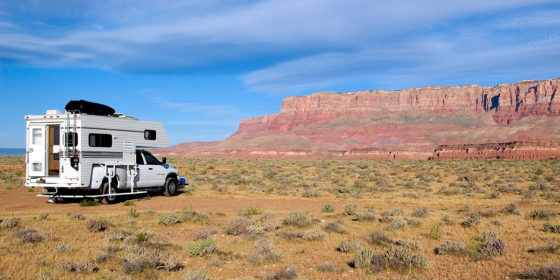Ten Reasons to Buy a Truck Camper
4 min read
There are many benefits to truck campers, including versatility, ease of storage, and fuel economy. Also known as slide-in campers, pickup campers, truck bed campers, or cabover campers, these units are being rediscovered as an ideal RV for boondockers and other free-campers. What better way to head out on a boondocking adventure than with an RV that fits in the bed of your truck? No worries about terrain, or maneuverability. And they aren’t just for boondockers! Anyone can enjoy the compact, go-anywhere fun of a truck camper.
Available in a variety of sizes and in both hard-side (hard walls like a trailer or motorhome) and pop-top (soft walls like a tent trailer) models, there’s a slide-in camper to suit virtually every truck and lifestyle. To help you learn more about these compact units, RVT gathered some of the top reasons to buy a truck camper.
1. Amenities of Larger RVs in a Compact Size
Truck campers have many amenities typically found in larger units, like kitchens with a sink, fridge, microwave oven, and cooktop; and bathrooms with a toilet and shower. Larger hard-side units may have multiple slideouts and be able to accommodate features like a full-sized couch or a spacious dry bath.
2. Maneuverability
One huge benefit to a truck camper is maneuverability. Drive Thru? No problem. Off-road? Sure. Driving in the city is easy, and you can park in a regular parking spot. It’s no hassle to get in and out of gas stations and rest stops. You can navigate switchbacks, tuck into the smallest campsites, and make a u-turn with ease. You’re limited only by your truck’s abilities.
3. Ideal for Boondocking
One of the most appealing attributes of the truck camper is it can go anywhere a truck can. If you like adventures in the backcountry, chances are you already have a pickup truck that can handle the terrain. Add a truck camper and you have a home on wheels. Boondock anywhere from meadows to beaches to Walmart parking lots—just make sure you’re permitted to be there first. And remember to leave no trace.
4. Easy Set Up
Some RVs take a while to set up and get organized. Not a truck camper. They’re easy to set up and tear down. And if you end up realizing you forgot the milk, it’s easy to drive to the store to get some. You can either leave the rig behind or take it with you.
5. Cook Anytime, Anywhere
Whether you’re tailgating in a parking lot, or sitting in a meadow in the mountains, you have easy access to all your kitchen amenities. No need to cook outside.
6. No Tires, No Motor
While there are other compact options out there for camping—like a Class B RV—truck campers are the only RV equipped with neither motor nor tires, so there’s often less maintenance involved. If a motorized RV needs to go into the shop while you’re on the road, you’re stuck in a hotel. A slide-in camper, however, can easily be separated from its host vehicle, allowing you to camp even if your truck needs a quick fix.
7. Better Fuel Economy
One challenge with towables and motorhomes is the fuel expense. Larger units are great for space and luxury, but they can really hit the pocketbook. Most folks find their fuel economy improves considerably when they make the switch from pulling a trailer to hauling a truck camper. Less payout at the pump may mean more dollars to spend on fun stuff.
8. Tow-Ability
Since truck campers sit in the bed of the truck, that leaves your hitch free for towing. Want to bring along a trailer for your kayaks, ATVs, or dirt bikes? You can! Just don’t exceed your hauling and towing limits. If you’re unsure of your limits, consult your dealer or owner’s manual.
9. No License & Registration (usually)
Truck campers are often considered to be cargo because they sit in the bed of the truck rather than being towed. Since they don’t have a VIN number (in most cases) or a rear axle, a license and registration often isn’t required. The states that currently require registration include Idaho, Indiana, Mississippi, Nebraska, Oregon, Rhode Island, Tennessee, Utah, and Washington. You can check with your local DMV to make certain a license and registration is not required in your area. Insurance is typically inexpensive for truck campers as well, often falling under auto insurance when away from home, and under your home insurance while parked there. Check with your insurance company to see if additional insurance is required for your unit.
10. Less Storage Space
Compared to other RVs, the truck camper has a small footprint when you take it off the vehicle, making storage simple and less expensive. If permitted, truck campers can often be stored on private property. Make sure you check the regulations for your area before storing your unit on your driveway or in your yard. If keeping the unit on your property isn’t possible, RV storage facilities often have inexpensive storage solutions available for truck campers.
Truck campers are one of the most versatile RVs on the road. With their compact footprint, easy set up, and excellent driveability, a truck camper could be the ideal camping companion for your next adventure. If you’re looking for a new or used truck camper, check out all the available units at RVT.com



